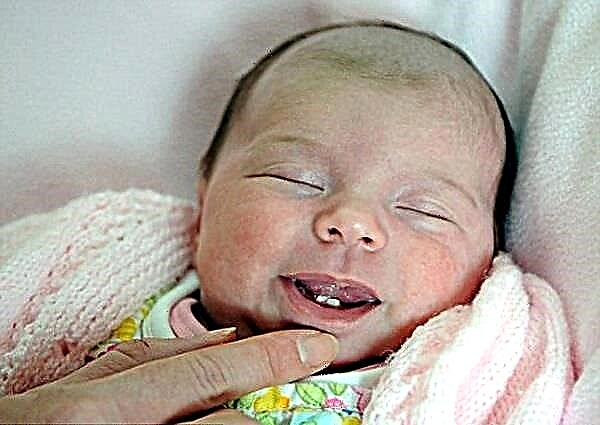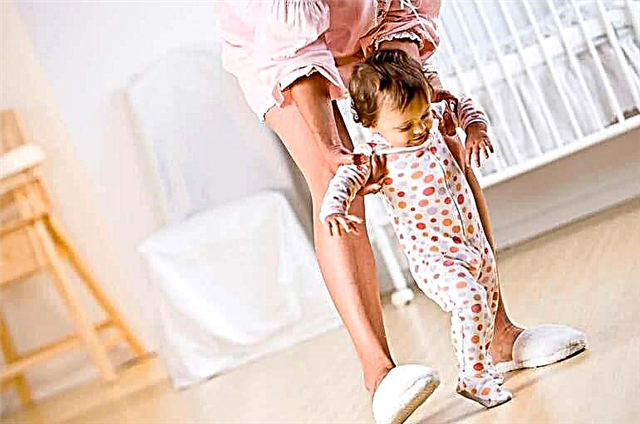The reasons for a newborn grunting nose can be different: a cold, improper care, physiology, or something else. Parents should be aware of the most common causes of nasal congestion in a newborn baby and understand how to help him.

The child has a stuffy nose
Where the grunt sounds come from
Why does a newborn baby grunt? Grunting sounds occur only when the air passing through the nasal passages bumps into a certain obstacle. It can be dry crusts, thick mucus, adenoid growths, polyps, a foreign body. The nasal passages of children under one year old are too narrow, and the mucus accumulated in them prevents the free passage of air. It is for this reason that you can hear various strange sounds that bother parents so much.
Important! Since a newborn baby is not yet able to blow his nose, mucus accumulated in the nose can remain in the nose for a very long time. It begins to thicken and dry out, which makes breathing very difficult.
Congestion of mucus in the nose
If the baby constantly grunts his nose, but the parents do not see the leaking nozzles, maybe the mucus accumulates deep in the nasal cavity.
Causes complicating the outflow of mucus from the nose:
- A newborn and a month old baby sleeps a lot and moves a little;
- Very dry air in the room where the baby is. For the respiratory organs, the most favorable humidity is considered to be about 50-70%;
- The air temperature in the room where the child sleeps is too high. Ideally, it should be between 18-22 degrees.

In case of stagnant mucus in the nose, it is worth using a rubber bulb
Dry crusts in the nose
If parents hear a newborn baby grunt, or loud sniffing and whistling in the nose of the crumbs are heard, this will be a clear sign that dry crusts have accumulated in the baby's nasal cavity. Most often, crusts appear due to dry air, lack of ventilation, dustiness of the room, abuse of heaters, rare walks in the fresh air.
Note! Dropping saline or saline nasal drops into the child's nose can greatly facilitate the breathing of the little nose. In addition, after applying the droplets, the crusts will become soft and easier to remove.
Teething of the first teeth
Teething causes increased production of mucus in the nose, which leads to constant grunting. The reason is local inflammation of the gums, leading to increased blood flow into the oral cavity, as a result of the formation of a large amount of saliva.
At the same time, there is an abundant secretion of nasal mucus, which contains a large number of lysozymes and interferons. It is these substances that have disinfecting properties and are secreted in order to remove gum disease. The congestion usually goes away after a week.
Postnasal flow syndrome
If wheezing in the nose begins to intensify at night and in the morning, accompanied by a wet cough, while the mother cannot pull out the mucus with an aspirator, this indicates that the baby has postnasal syndrome. This is a phenomenon related to pathological conditions, during which the mucus that forms in the nasopharynx begins to drain down the throat and accumulate on the back of the pharynx. All this provokes inflammation in the nose.
Symptoms of postnasal drip syndrome include:
- grunting in the nose at night and in the morning;
- the child begins to cry and cough in the morning;
- redness of the throat;
- sleep disturbance, the baby often grunts and tosses and turns.
The cause of postnasal drip syndrome is a runny nose of any type. Normally, mucus from the nasopharynx should flow both out and into the pharynx, while not accumulating on the walls of the throat.
Additional Information. Dry air leads to thickening of mucus, it begins to hang on the back of the nasopharynx, which causes a wet cough, grunting in the nose and sore throat.

The baby's nose is not breathing well
Foreign body
If the baby's nasal congestion occurs suddenly and does not go away even after using vasoconstrictor drops, the parents should suspect that the child has a foreign body in the nasal passages. At the same time, the baby can not only grunt and rub its nose, but also cough. If the spout is empty, then the cause of the congestion is different.
How to help a child
If a newborn baby's nose grunts, then it is possible to facilitate the breathing of the crumbs and reduce the risk of complications by observing some rules:
- Clean the toddler's nose every day using cotton swabs with a stop or gauze turunda;
- To remove a large amount of mucus from a small nose, use a special nasal aspirator;
- To ensure active nasal breathing and prevent stagnation of mucus in the nasopharynx, it is very important to play with the child for a long time, turn from one barrel to another, do a light massage;
- Provide a suitable temperature and humidity in the room where the baby sleeps;
- During the heating season, you should moisten the child's nose several times a day with nasal drops or use a special humidifier to maintain the required air humidity;
- Provide regular airing of the children's room, especially before bedtime;
- Carry out daily wet cleaning.
Important! If the baby grunts and he has a severe runny nose, it is necessary to consult a pediatrician, he will prescribe appropriate treatment.

Using saline to moisturize the nose
Which doctor to contact
If the baby grunts violently, the cause of this symptom may be a curvature of the nasal septum, narrowing of the nasal passages, and other abnormalities in the structure of the nasopharyngeal organs. Only an ENT doctor can establish such problems. The method of treatment can be chosen only by determining the cause and stage of development of the deviation. In a newborn, the body is just forming, after a slight correction it can still independently return to its normal state.
First aid for grunting
If a newborn baby begins to sniff, wheeze, grunt, sneeze, or make other strange sounds during breathing, parents should first check the nasal passages. If a foreign body is found there, you cannot try to get it out on your own, you need to call a doctor or an ambulance as soon as possible.
If dry crusts were noticed during the inspection of the spout, they can be removed with the help of saline and cotton balls. You need to drip saline into each nostril, put the baby on his back, let him lie down for 10-15 minutes. When the crusts soften, they can be removed with a special suction or flagellum.
note! You cannot use ordinary cotton swabs to clean the nose - they can injure the child's delicate nasal septum.

Improper peeling of crusts
Proper hygiene
Nasal congestion in babies can lead to more serious consequences. If you do not take timely measures when the child sniffs and grunts, parents may face allergic reactions and infectious diseases.
If a newborn baby grunts at night, but the snot does not flow, most likely, the reasons for this condition are physiological. To alleviate the condition of the baby, it is enough to observe the hygiene of the nasal cavity. To do this, you should alternately clean the nostrils with cotton buds with stops, if this is not enough, rinse.
What not to do:
- You cannot clean the baby's nose with cotton swabs. They are too wide and long, moreover, hard, and the mucous membrane of the baby is tender. There is a danger of injury.
- Do not use aerosols to restore breathing. They are not intended for babies. The aerosol, if it enters the middle ear, will cause otitis media. The nostrils can only be instilled and not with drops, but with olive oil or saline.
- Do not make the saline solution too concentrated - it will burn and dry out the mucous membrane. The solution is prepared at the rate of 1 teaspoon of salt per 1 liter of boiled water. The water should not be hot. Drops can only be used as directed by a doctor.
- When cleaning, it is necessary to observe the depth of entry into the spout no more than 1.5 cm.
- Do not use nasal sprays with sea water, treat with warming compresses, essential oils.

The use of sprays is prohibited for children under one year old
The opinion of Dr. Komarovsky
Komapovsky does not get tired of repeating about the importance of the indoor climate, where the child spends most of the time. It is this factor that he calls the main one in the problem of the appearance of characteristic puffing. To prevent it, the doctor advises:
- Observe the air temperature within 21 degrees, humidity about 70%. This is especially important in the first month of a child's life;
- Carry out daily nasal hygiene for the baby;
- Increase the time of daily walks, fresh air helps to naturally cleanse the respiratory tract;
- Maintain the body's water balance.
Additional Information. With large accumulations of crusts, inhalation can be carried out with physical. solution or decoctions of herbs. They are safe and effective, it is best to use a nebulizer for such procedures.
Prevention measures
In order not to worry why the baby grunts his nose, it is enough to follow a few simple recommendations.
Preventive measures include:
- Daily wet cleaning;
- Maintaining optimal humidity;
- Regular airing;
- Stay in the fresh air for at least 4 hours a day;
- Cleansing the nose if necessary, in particular after regurgitation;
- Massage;
- Normalization of the intestinal microflora with symptoms of dysbiosis;
- Careful introduction of new products into the menu, followed by observation of the reaction of the newborn;
- Exclusion of contact with respiratory allergens (house dust, household chemicals, flowers, low-quality toys and clothes, pets);
- Prevention of accidental contact of the child with especially small objects that can get stuck in the nose.
Grunting can occur for physiological reasons or signal that the child has difficulty breathing. To improve the condition of the baby, it is necessary to improve the conditions in the house and provide proper care for the baby's nose. If the situation does not improve, you should see a doctor.



